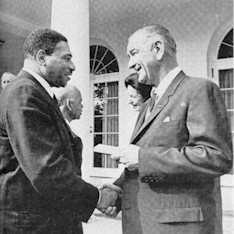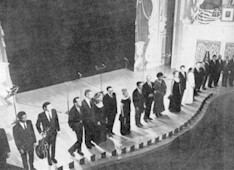 |
|
 |
Intro | First Years | 1919 | 1920's | 1930's | 1940's | 1950's | 1960's | 1970's | 1980's | 1990's 2000-2003 | 2004 | 2005 | 2006 | 2007 | 2008 | 2009 | 2010 | 2011 | 2012 | 2013 |
 |
"The Cold War on Broadway" |
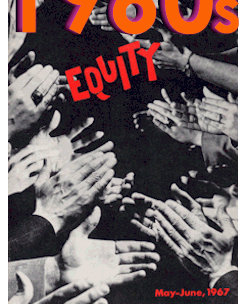 Equity Magazine, May - June, 1967 1960
BROADWAY BLACKOUT As the June 1st contract deadline approaches, The New York Post calls it "The Cold War on Broadway." A nervous Mayor Robert Wagner, Jr. charges Labor Commissioner Harold A. Felix with keeping an eye on the dispute. On May 24th, 3,000 Equity members show up for a 12:30 AM meeting at the Edison Hotel, which can only fit 1,000. The actors create an impromptu early morning parade, singing and dancing down Broadway to the larger Hotel Astor. Members support the strike plan: if no agreement is reached by May 31st, one Broadway show per night will be shut down. The League calls this a "hit and run tactic," and promises that if one show is shut down by the actors, they will all be shut down. Sure enough, on June 1st, the play The Tenth Man is closed down by the union, and soon after, the League shuts down the rest of Broadway. The League calls it a strike, Equity calls it a lockout. The papers call it the Broadway Blackout. Joseph McNamara writes in the Journal American: "For the first time in 40 years, the footlights seemed about to be dimmed with the only spot the one both producers and actors find themselves in..." After 13 days, Mayor Wagner offers a solution: he will repeal the Amusement Tax and the producers will instead pay a percentage of box office receipts into a Fund to finance pension plans for the various Broadway unions. April 14
Looking back on the Elvis phenomenon with humor and affection, Bye Bye Birdie by Charles Strouse and Lee Adams opens at the Martin Beck. May 3
The Fantasticks, opening tonight at the Sullivan Street Playhouse, will go on to become the longest running show in New York history. December 1
A new trade weekly for performers called Backstage is published for the first time. The magazine has the ambitious mission to "bridge the gap between performer and public..." says publisher Allen Zwerdling. John Fitzgerald Kennedy is elected President. 1961
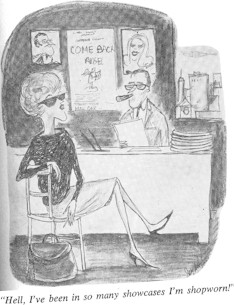 Equity and the League agree that no member of Equity shall be required to perform where discrimination is practiced. In April, a failed coup of Castro's regime at Cuba's Bay of Pigs is a severe blow to the Kennedy administration. In May, The Freedom Riders challenge segregation in the South. December 28
Night of the Iguana by Tennessee Williams opens at the Royal. 1962
"Look for the Union Label..." Equity joins the Union Label, a public relations arm of the AFL-CIO designed to broaden the awareness of American unions. January 5
At a New York Quarterly meeting, Judith Malina urges Equity to support the world wide general strike planned for the week of January 29th against "the race to war in which the great powers are engaged." Malina quotes the philosopher Bertrand Russell, who has strongly supported the general strike. Councillor Stanley Tackney wonders why Khrushchev would be impressed by New York actors going on strike, and also states that Bertrand Russell had also supported the Munich Pact of 1939. Malina's proposal is defeated. February 6
In President Kennedy's Special Message to Congress, he states that if America is to be "among the leaders of the world in every sense..." then the arts cannot be neglected. The World's Fair is held in Seattle, Washington, sparking the creation of the Seattle Center, home of The Intiman Theatre, the Seattle Repertory and the Seattle Children's Theatre. The non-profit Actors' Equity Foundation is created to help members in need. May 8
A Funny Thing Happened on the Way to the Forum opens at the Alvin. June 18
George C. Scott plays Shylock in The Merchant of Venice as The New York Shakespeare Festival begins free performances at Central Park's Delacorte Theatre. |
October 13
Who's Afraid of Virginia Woolf? by Edward Albee opens at the Billy Rose Theatre. Critic John Chapman says the play is "four characters wide and cesspool deep." Missile Crisis: In October, the U.S. and the Soviet Union come "eyeball to eyeball," as Secretary of State Dean Rusk puts it. After a tense standoff and American blockade, the Soviets withdraw their missiles from Cuba. The U.S. continues to build up troops in Vietnam. December 5
The Actors Federal Credit Union is chartered, aimed at “dealing effectively with the actor’s perennial problems in obtaining credit, getting loans, and money management in general.” 1963
The actor "cannot plan his economic life on a year-to-year basis, and cannot have a decent, normal economic life under present tax impositions..." Ralph Bellamy is in Washington to testify on behalf of President Kennedy's proposal for an income tax spread. In honor of Equity's 50th birthday, Brooks Atkinson compiles a list of 50 people who have enriched the American theatre: "I can't squeeze another name in...When Actors' Equity becomes one hundred years old, the task will be easier. Send me a radiogram to heaven or hell, as the case may be." March
Council Member Earle Hyman will play Othello at Norway's national theatre in Bergen. Hyman is one of the few members of the union who can speak fluent Norwegian. May 7
Jessica Tandy is Gertrude in an Edwardian Hamlet, the premiere production at the new Tyrone Guthrie Theatre in Minneapolis, heralding the beginning of the resident theatre movement. August 28
"I have a dream...": Two hundred thousand people hear Martin Luther King, Jr. and others speak for freedom at the Lincoln Memorial. Russell Baker writes, "The sweetness and patience of the crowd may have set some sort of national high-water mark in mass decency." Banner at an October Equity membership meeting: "PAUL REVERE TRIED TO WARN US." Members are angry at the continued importation of British actors. November 22
President Kennedy is assassinated in Dallas. Ralph Bellamy writes, "His recognition and encouragement of our cultural expression have advanced us as a people, in our esteem, as well as in the estimation of others." Vice President Lyndon Baines Johnson is sworn in. 1964
January 23
President Johnson authorizes more than $15 million to match private donations for the building of the John F. Kennedy Center for the Performing Arts in Washington, D.C. February 18
"The muses sing when the guns are silent," says Boris Pokarzhevsky, director of the Moscow Arts Center visiting the staff of Equity as part of the cultural exchange program between America and the USSR.
27 HOURS September 22
Fiddler on the Roof has the first of what will be 3,242 performances at the Imperial. The Walnut Street Theatre in Philadelphia, the oldest theatre in America, is designated a National Historic Landmark. September 29
Lyndon Johnson signs the bill establishing a National Foundation on the Arts and Humanities, stating, "What this bill really does is to bring active support to this great national asset, to make fresher the winds of art in this great land of ours." Between 1959 and 1965, Equity officers appeared before nine Congressional committees in support of government aid for the arts. In December Johnson will preside over groundbreaking ceremonies at the John F. Kennedy Center for the Performing Arts. Congress passes the Civil Rights Act. Congress passes the Tonkin Gulf Resolution, granting Johnson power to defend U.S. forces in Vietnam. Johnson is elected president.
1965
November 22
It's not an "Impossible Dream": Man of La Mancha really will play 2,328 performances after opening tonight at the ANTA Theatre. Malcolm X is assassinated at the Audubon Ballroom in New York City. 1966
The first LORT (League of Resident Theatres) contract is signed, establishing Equity's jurisdiction in the growing regional/resident theatre movement, leading to the expansion of opportunities for Equity members throughout the country. May 25
Angela Lansbury stars in Mame by Jerry Herman, opening tonight at the Winter Garden. November 20
Cabaret opens on Broadway with Joel Grey and Lotte Lenya. Ann Reinking makes her Broadway debut in the chorus. Founded this year by John E. Allen, Freedom Theatre will go on to become Pennsylvania's oldest African-American theatre. NYC's Roundabout Theatre has its first production: Strindberg's The Father. |
1967
Equity is a founding member of SPACE, the Council of Scientific, Professional and Cultural Employees, an organization of 17 unions representing some 400,000 "white collar" workers. In December 1977, the Council is officially chartered by the AFL-CIO as a semi-autonomous constitutional or "trades" department, to be known as the Department for Professional Employees (DPE). George Meany calls this step "a major turning point...whose impact will be felt throughout the labor movement and the society as a whole." At its 25th anniversary, the DPE boasts more than four million members from 25 unions representing professional, technical, and other highly skilled white collar workers. William Ball founds American Conservatory Theatre in San Francisco.
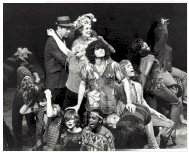 Hair, 1967 © George E. Joseph April 14
The first production at the Mark Taper Forum in Los Angeles is The Devils, starring Frank Langella. October 29
Hair, the "American Tribal Love-Rock Musical," opens at the Public Theatre. It will reopen on Broadway at the Biltmore in 1968. As the year comes to a close, Angus Duncan says, "Let this be fair warning to all with whom we may negotiate. We intend to be fair; but we also intend to negotiate from a position of strength. These may well be trying times. Let them try us. We won't be found wanting." 1968
January 30
Equity President Frederick O'Neal was determined that Washington D.C.'s Ford Theatre reopen, not as a shrine to Abraham Lincoln, but as a "living memorial to his love for theatre." Thanks in large part to Equity's efforts, it does tonight.
June
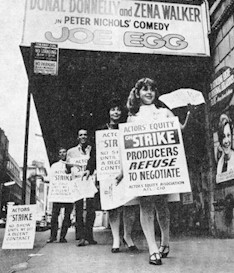 They tried to tell us we're too young - hardly old enough to be labled "teen-ager", Moni Ferguson, formerly appearing in JOE EGG, offers a fact sheet to a passer-by and heads up the line of pickets in front of the Brooks Atkinson Theatre. "Pension and more sanitary working conditions were all just a dream in that era..." So says Dan Courtney, a chorus boy during the strike of 1919, now manning the pickets in front of the Winter Garden Theatre. On June 2nd, membership had rejected the contract offered by the League and urged the Negotiating Committee back to the table. But the League refused to talk. A strike is called on June 7th: Broadway is shut down for three days. Finally Mayor John Lindsay intervenes and an agreement is reached, gaining for Equity the largest increase in minimum salary up to that point.
The Oriental Actors of America picket a New York City production of The King and I, which cast Caucasian actors to play Asian roles. Co-chairman Alvin Lum says, "Obviously, the Management believes the Oriental is incapable of portraying himself." Berkeley Repertory Theatre is founded. October 3
The Great White Hope starring James Earl Jones opens at the Alvin. Shocking!: Headline in September/October Equity Magazine, "Humphrey-Nixon: They agree on importance of cultural arts"! Martin Luther King, Jr. is assassinated while standing on the balcony of the Lorraine Motel in Memphis, Tennessee. Senator Robert F. Kennedy is assassinated at the Ambassador Hotel in Los Angeles. Richard M. Nixon is elected President. 1969
May 13
Equity promulgates its official policy on nudity and sex acts in the theatre, establishing strict rules for auditions, contract language and performances. March 16
Just in time for bicentennial (minus seven years), 1776 by Sherman Edwards and Peter Stone opens at the 46th Street Theatre. June 15
Equity finalizes a contract with the Producers Association of Children's Theatre. Union shop and rehearsal pay are established. July 20
"One small step for man, one giant step for mankind." Neil Armstrong becomes the first man on the moon. The first annual Joseph Jefferson, or "Jeff" Awards, celebrating outstanding achievement in Chicago theatre, are given out on October 6th.
|
||
| to timeline introduction... | ||||
